- Home
- E. F. Benson
The Second E. F. Benson Megapack Page 5
The Second E. F. Benson Megapack Read online
Page 5
Solid, monotonous good luck had followed him all the days of his life. Ever since the night when he was sixteen and so happily stole the pocket-book, all he had touched turned to gold, all he had desired had been granted him, all his ideals (such as they were) had frozen into cold suetty facts. Half of the thirteen pounds which were the result of his original theft had been expended in reach-me-down clothes and ready-made boots (which, in those happy years, could be purchased by others than millionaires), for it was symptomatic of him never to grudge money when it was probably a good investment, and between his natural smartness of face and carriage and the acquired smartness of his new clothes, he had at once got a place as hall-boy in an hotel.
He learned to swim in the Chelsea Baths, and August was scarcely begun when this recreation was turned to solid account, for, being at Margate on bank holiday, a pleasure-boat conveniently capsized near him, and he easily rescued the only daughter of a prosperous bookmaker. That gentleman seemed not to resent the unexpected survival of a rat-faced child, had given him fifty pounds in cash, and, subsequently, several racing tips by way of a gilt-edged security for the fifty pounds. These proved not to be gilt-edged only, but completely covered with pure gold.
Then came the news of possibilities in South Africa, and, gambler as he was in every drop of blood in his body, he had gone for these with a thousand pounds to his credit. He threw his thousand pounds at the Rand, and, as if he had given it a little emetic pill, the Rand belched gold at him. In ten years (though he had enjoyed those years quite enormously) the savour of money-making grew stale, and with a brilliant excursion into American rails, which returned him his fortune more than doubled, he quitted the speculative arena, and for the last decade and a half had looked with eyes of incredulous wonder at the extraordinary gentlemen who continued to go to offices in the city all day long and industriously accumulate what they did not want.
There was one such here tonight, a great, round, dark man with yellow hair, the colour of a London fog. He took a grudged month’s holiday in the year, but otherwise sat in an office w ith his ear to a telephone and his mouth to a speaking-tube. Perhaps it amused him, for certainly there was always in his eye a remote twinkle, as if he had constant grounds for private mirth, and Arthur Whately had often suspected him of being a secret humourist. Yet in the ordinary commerce of social life none was so heavy or so commonplace. He and his wife were social climbers of pathetic industry, who gave parties that tried to be smart and only succeeded in being garish. Yet there was that secret twinkle in his eye.…
The same good luck had dogged Arthur Whately in affairs more intimate to his happiness than gold. He had married the woman whom he adored, and just when his adoration had cooled and she was beginning to bore him to extinction, she had run away with somebody else. He had wanted the particular house in which he now sat, and the owner had died just when his demise was most convenient, leaving his affairs in unutterable confusion, and his executors were delighted to sell everything. He had, again, in artistic spheres, conceived a violent passion for the pictures of Giovanni Bollini, and an impecunious peer, foreseeing that income taxes and death duties were swelling like inflated footballs, had sold him his priceless collection, which now hung round the walls of his dining-room. Finally, on this particular evening, when he felt very much disinclined to go out, Providence had sent a fog to serve as an excuse for stopping in. And yet bridge was rather a stale affair. There was a certain intellectual pleasure in thwarting other people, but it was not much fun being clever when the rest were, comparatively speaking, such fools.
His private band had been assembled in the gallery of the ballroom, in case music was required, but they had been dismissed, since the four went straight from the dining-room into the fan-room, where a card-table was laid out. These fans were famous, and had once been the property of Marie Antoinette and other ladies, whose goods had been disposed of after their death by their executors or executioners, and Arthur Whately had acquired them at immense expense during the year of his married life to please his wife.
Shortly after he divorced her, an attempt had been made by a burglar to steal them, but an ingenious device, invented by himself after his wife’s departure, had impeded the idea, for anyone entering the fan-room after the apparatus had been set caused merry peals of electric bells to break out in the rooms of the butler, footmen, odd man and other able-bodied persons, and the intended burglar had been caught fan-handed. But his confession that the late Mrs. Whately had commissioned him to attempt this job so interested Arthur Whately that he took no proceedings with regard to him, except to give him supper. His wife, simultaneously, rose considerably in his estimation; he had not known she had so much blood in her.
The fan-room overlooked the Park, and regardless of possible interpretations Arthur Whately had straw permanently put down in the roadway to deaden the noise of traffic. There had been a ruffle with the vestry on the subject of this straw. Men with pitchforks came and took it up. But as often as they took it up he had it renewed, and by now it had become as much a feature of Park Lane as the omnibuses. Occasional lv a policeman, new to the beat and fired by professional enthusiasm, would question the straw-strewers, but the mystic whisper, “A friend of Mr. Whately’s,” had the forcefulness and wit of brevity about it.
The game was tepid; not even his opponent’s remarkable and reiterated revoke in no-trumps really warmed it, and Arthur Whately was glad when his guests departed, for, unaccustomed as he was to brooding over imaginary troubles or dulling his very acute brain with the narcotic poisoning of selfanalysis, he was a little anxious about himself tonight, and was glad of a quiet hour before going to bed to examine the cause of his disquietude. It was still early when they left, for there was a dance somewhere to which the two ladies with the irrepressible enthusiasm of advanced middle-age were going on, while the financier was going home. On the doorstep he confided to his host that his name was to appear next morning among the peerages given in honour of the King’s Birthday, and Arthur Whately supposed he was going to seek the privacy of his own study to practise writing his new name, which was to be Peebles, in memory of pleasure.
He adjusted the bell-pealing apparatus in the fanroom, and retired to his own sitting-room, which adjoined his bedroom. Half a dozen exquisite Watteaus decorated the walls, and the bureau which stood opposite the door was from the effects of the unfortunate Queen of France. Often and often he had thrilled at the thought that she had sat there and written those little ill-spelled notes in her sprawling hand, but tonight he would not have cared if he had found her sitting there in person.
Taedium vitae, the weariness, the boredom of success, which poisons the lives of emperors and scratch golfers, had laid its heavy hand on him. He had poached the world like an egg. But he could find no salt.…
So it was that which ailed him. Often of late he had found he had little zest for this pursuit or that, but it had not struck him till this moment that the whole affair was flat. And yet it was not himself, so he felt, that was to blame. He was still but a year or two past fifty, handsome and healthy, and his powers of enjoyment he knew were undimmed, provided only he could find something to exercise them on. In himself he was eager, alert, longing for excitement, but to do the same thing over and over again did not excite him; the early years of hunger and struggle and achievement had accustomed him to a high level of emotion. He wanted to burn, not to smoulder quietly away, as most people were content to do.
Indeed, he had done everything he could think of. He had loved and married, and been bored, and had no intention of tempting the ennui of domesticity again. Nor had he any tastes for the more irregular pleasures of the senses; they were all poached and saltless. Material possessions, of course, had ceased to interest him, since he was completely surrounded with all that he thought most exquisite in the world of art, and to accumulate for the mere sake of accumulation seemed to him an exhibition of pig-trough greed. And it was so easy; he could buy anything that was for sale.
Perhaps if Mr. Morgan or some insatiable hoarder owned a desirable piece or picture and would not part with it at any price, he might find a secret rapture in attempting to steal it, just as his wife had done with the fans, but otherwise the act of acquisition had become too easy to be any longer agreeable.
Everything wanted salt, but that was the fault of the objective world. He, subjectively, had as good an appetite as on the entranced and canonized evening when he stole the pocket-book of the silly pink man, that unconscious founder of his fortunes, who, vastly sillier than ever, had dined with him only last week, and had had a fatal apoplectic seizure immediately afterwards.
Tonight he almost cursed his memory for his foolishness thirty-five years ago, for it was that theft which had led to this weariness. If only the poor pink departed had caught him and given him a taste of gaol, Arthur Whately felt that he might now be rapturously pursuing the thrilling hazardous paths of the hardened criminal, to whom every house is a possible crib to be cracked, every jewel in a woman’s necklace a week of delirium and drunken debauch. But where is the fun of stealing if you already own more than you can possibly want?
In his mind he swiftly ran through the ten commandments, and found, as he had feared, that it would not give him the slightest pleasure to break any of them. There might be a little excitement about bearing false witness against your neighbour, but then that would entail appearing in a law court and listening to the pitiful humour of some fussy judge. As for the rest of the commandments, they suggested nothing amusing. There was nothing to be done with the fifth, because his father and mother had been dead for years; the sixth implied blood and violence, and violence was foreign to his nature. But for a moment he lingered over the picture of strangling Lord Peebles and burying him in the straw in Park Lane. There was something grotesquely attractive in the notion, but probably the coroner’s jury would give their verdict that he had been strangled by natural causes, and that death had been accelerated by the immediate prospect of a peerage. He himself had thrice been offered a peerage, once by the Liberals, once by the Conservatives, and once prospectively by the Labour Party. His invariable answer had been that previous engagements prevented him accepting their kind invitation. That had amused him at the time; now it seemed deplorably witless. But could he not devise something for Lord Peebles that should spoil his pleasure? Why should Lord Peebles have that secret twinkle in his eye? Why should he, at his age, be still enjoying life? Whately felt a murderous impulse towards his friend’s mirth.
But he could think of nothing, and with a sigh he took up a copy of that unique journal which is so justly famed for chronicling that which has not occurred and prophesying that which will not possibly happen, and scarcely glancing at the leader, probably inspired by Ananias, and the fashionable intelligence, certainly gleaned by Sapphira, he turned to the more reliable records of the police courts. There had been a brutal murder—apparently the transgression of the sixth commandment was not wholly unattractive to people less tiresomely fastidious than himself—and a certain blameless archdeacon whom he knew slightly had, after the receipt of a series of threatening letters, to which answers were requested to be sent (accompanied by stout remittances) to A. M., Martin’s Library, Wardour Street, reluctantly taken proceedings against the blackmailer, who had been rewarded with five years of enforced seclusion.
Arthur Whately wondered whether he himself would have the courage to prosecute a blackmailer. Probably not; with his wealth it would be easier to satisfy the most rapacious. It was brave of the archdeacon; no doubt his artificially fostered sense of duty sustained him.
His thoughts wandered on as he stared at the newspaper. Would he himself ever have the courage to blackmail anyone else? It must be the most exciting game, and to play it successfully would demand an extraordinary amount of intuition and knowledge of human nature. All depended on the character of your proposed victim. It would be as hopeless to try to extract money with threats out of some men, however scarlet the secrets of which you had possessed yourself, as, singlehanded, to extract a lion’s teeth. Others, no doubt, would equally certainly yield at once to the most veiled menace.…
Suddenly the paper which he held began to rustle with the involuntary tremor of the hand that held it, and an eager excitement shot up like the light of a petroleum-soaked beacon in his dulled eye. He need no longer seek for agitation. He had found, when he least expected it, the answer to his fruitless appeals to the universe to supply him with interest. In the excitement of the moment he poured a liberal dose of whisky into a tumbler, but next minute poured it back. He had to keep his head cool; artificial stimulant only led to subsequent reaction and torpidity of thought. But through the prison bars his spirit grasped hands with the archdeacon’s victim. He would certainly blackmail somebody.
There were two questions to settle. Whom should he blackmail, and what had his victim done? A moment’s incisive thought told him that the second question, as to what the supposed crime had been, was alien and superfluous. The poor man need not have done anything. He need only be told that the events which occurred between, say, August 2 and August 10 of the year before last were known to his persecutor. All else depended on the selection of a suitable victim. If an unsuitable subject was chosen, one whose life (could such be found) was of virtue so monstrously Spartan, that he would not mind the events of August 2 to 10, or those of any other date, being known, it was clearly impossible to proceed. On the other hand, if his life was so voluminous a catalogue of crime that there were terrible affairs in every week of it, a notified period like this would create no particular impression.
Yes, it was the character of the victim that must be studied if the aesthetic blackmailer was to have any fun, for, of course, in the case of Arthur Whately, the mere extraction of two or three hundred pounds (thousands, perhaps, if his prey was wealthy) meant nothing at all. And the largest ingredient in the fun would be the uncertainty as to how the victim would behave, whether he would take proceedings or pay. He must therefore be cast in no iron mould; there would be little sport in writing just one letter and then being sent to join the poor worm so grindingly crushed by the heel of the valiant archdeacon, nor, on the other hand, would there be any zest in the punctual receipts of cheques whenever demanded. He had to think of somebody not too good and not too bad, not too brave and yet not pigeon-livered. For a while his mind hovered, singing like a skylark in the exultation of this absorbing preoccupation, then suddenly it dropped to earth again. There was none so fit as Lord Peebles.
His hand trembled for the pen that was mightier than the sword, and after a few moments’ concentrated thought, he dashed off these cold, cruel lines, which would serve as the basis for attack:
My Lord—
While congratulating your lordship on the well-deserved honour which the King has paid you, I feel it my duty to let your lordship know that the events which took place between August 2 and August 10 of the year before last are completely in the possession of the undersigned, and are supported by documentary evidence of such sort that nobody who saw it could ever doubt its authenticity. I am prepared to give up to you all such papers as are in my possession for the sum of £2,000.
I am a poor man, and a desperate one, but am strictly honourable in all business matters such as this, and on receipt of that sum in gold I will strictly carry out my obligations. Should your lordship take no notice of this communication or refuse to comply with my request, the whole affair will be made public.
I am well aware that I put myself within reach of the law in thus addressing you, but I would ask your lordship carefully to consider the results to yourself if you prosecute me. The circumstances of which I am possessed will then all come out, and while it matters very little to me whether I pass the next few years in prison or not, I think that the consequences to you will not be so lightly regarded by self and family. You have a great deal to lose; I have nothing.
Kindly communicate with me at Martin’s Library, Wardour Street, by today w
eek at latest. Having no club or settled address at present, I call there daily for letters and occasional parcels—
Faithfully yours, George Loring.
In obedience to the business-like qualities which had raised him to the position of multi-millionaire, his mind instantly went into committee over details. It was but very rarely that he employed his own hand in writing, for his correspondence was entirely dealt with by secretaries and typewriters, but it would be well to disguise his ordinary caligraphy. Or, stop—there was a safer way, and the next minute the Remington typewriter which stood in the corner of the room was opened and gleamed with bared keys. He was no adept at this clattering finger-exercise, but after a few abortive trials, he made a clumsy transcript of the letter, and directed an envelope by the same mechanical device.
Already the cautious instincts of the habitual criminal had awoke in him, and after replacing the cover on the typewriter he carefully burned both his manuscript draft and the insane gibberish of his first typed attempts, and opening his window let the blackened ashes float down into the straw-covered roadway. It would never do, again, to let the incriminating document lie among the other letters for post, and he hid it below the shirts in a wardrobe drawer in his bedroom in order to post it himself at some central letter-box next morning after verifying the existence of Martin’s Library. Then, since it was already very late, he went to bed with eager anticipation for the morrow and many morrows.

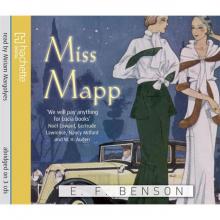 Miss Mapp
Miss Mapp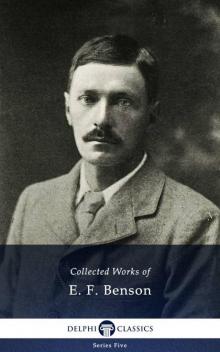 Works of E F Benson
Works of E F Benson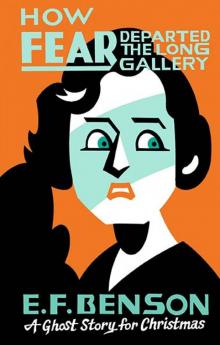 How Fear Departed the Long Gallery
How Fear Departed the Long Gallery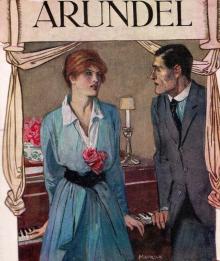 Dodo's Daughter: A Sequel to Dodo
Dodo's Daughter: A Sequel to Dodo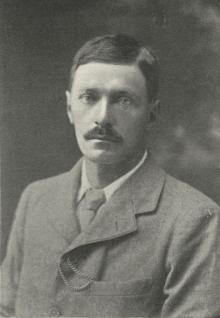 The House of Defence v. 1
The House of Defence v. 1 Queen Lucia
Queen Lucia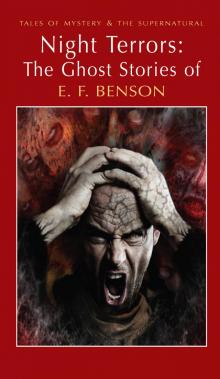 Night Terrors
Night Terrors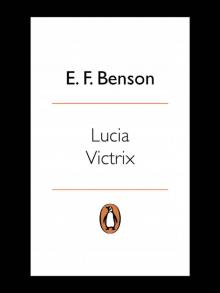 Lucia Victrix
Lucia Victrix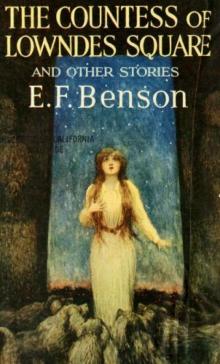 The Countess of Lowndes Square and Other Stories
The Countess of Lowndes Square and Other Stories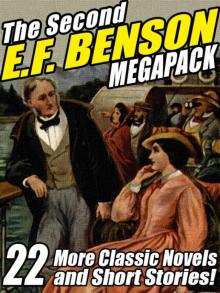 The Second E. F. Benson Megapack
The Second E. F. Benson Megapack The Complete Mapp & Lucia
The Complete Mapp & Lucia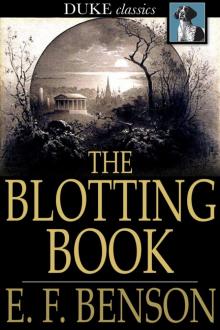 The Blotting Book
The Blotting Book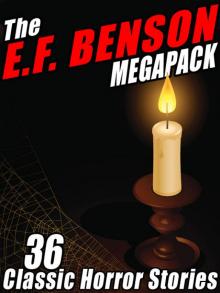 The E. F. Benson Megapack
The E. F. Benson Megapack Lucia Rising
Lucia Rising Ghost Stories
Ghost Stories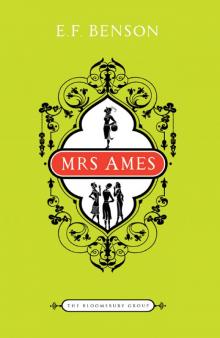 Mrs. Ames
Mrs. Ames E. F. Benson
E. F. Benson